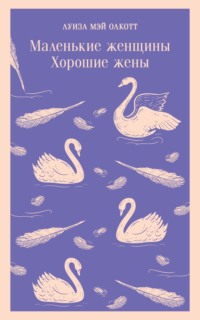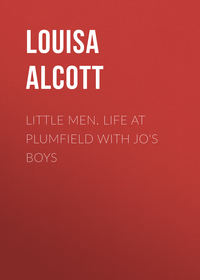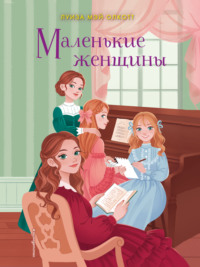 полная версия
полная версияLulu's Library. Volume 1 of 3
"Ah! these must be very elegant people to live in this luxurious way. They sing pretty well, but not one has a splendid deep voice like mine. I 'll jump in and astonish them with my best song," said Croak, after he had watched and listened for a while.
If he had only known that these frogs were kept there to be fattened for an old French gentleman to eat, he would have skipped away and saved his life; but he was so anxious to show off his voice, that he gave a jump and went splash into the tank, startling the others and making a great commotion. He liked that; and getting up on the highest stone, gave them his favorite "Ker honk" song, till the air rang with the sound.
The other frogs were much impressed, for they thought it fine music; so they gathered round, and shook hands and welcomed the stranger, sure that he must be a distinguished musician, he put on such airs. Now Croak was in his glory, and puffed himself out, and goggled at the lady-frogs till they put up their fans of green flag to hide their smiles. The young fellows tried to imitate him, till the tank was such a noisy place the old gentleman said to his cook, -
"Kill off a dozen of the fattest for dinner, and stop that din out there."
The frogs had told Croak that every now and then some of them were chosen to go and live in the great house; and all were eager to find out what good fortune had happened to their friends, for none ever came back to tell the sad truth. So when they saw the man in the white cap and apron come to the tank and look down at them, they all began to skip and prance, hoping to be chosen.
With a long-handled net the cook picked out the fattest and put them in a covered pail till he had his dozen. Croak had not been there long enough to get very plump, so he would have escaped that time if he had held his tongue. But he could n't keep still, and made such a terrible noise the cook said, -
"I must catch and quiet that rascal, or my master will go distracted." So he held the net open; and that silly frog hopped in, little dreaming that he had sung his last song.
"Now we shall see fine things. Good-by, you poor dears! Be patient till your turn comes," he cried, as the bucket was carried away to the kitchen.
Croak was disappointed when he saw nothing but pots and pans and a great fire; for the vain fellow really thought he was chosen to sing before some fine people. But his disappointment turned to horror when he saw his friends taken out one by one and their poor little legs cut off to fry for dinner. That was the only part the cook used, and the rest he threw away. Croak was left to the last, as he was not to be eaten; and while he waited his turn, he dashed distractedly round and round the pail, trying to get away, and croaking so dismally it was a wonder the cook did not take pity on him. But he did not, and was just going toward the pail with the big knife in his hand, when the old gentleman came down to see if his orders were obeyed, for he thought a great deal of his dinner. All the poor little legs lay in the pan ready to cook; and he was so pleased that he said, looking at the thin frog swimming about in that lively way, -
"Ah! this is a very brisk fellow. I will put him in my aquarium; the gold-fish and the crab will like a little society, I think."
Then, catching Croak by one leg, he carried him upstairs and threw him into the great glass box where several pretty gold-fish and one cross crab lived together. Croak was so glad to escape frying that he was very quiet, humble, and good; and though his new home was a prison, he tried to be contented, and never complained when the lovely fish called him ugly and the cross crab nipped his toes. He was homesick, and longed sadly for the pleasant river, the jolly games he used to have, and his dear little sister. He never sang now, fearing to be killed if he did; but when the windows stood open through the summer night and he heard the music of his friends, he put his hands before his face and cried such bitter tears that the water grew quite salt. He bore it as long as he could; but his heart broke at last, and one day poor Croak was found floating on the top of the tank quite dead. So that was the end of him.
Good little Splash lived at home all safe and happy, and was so kind to every one that her neighbors loved her dearly and sung her praises at their evening concerts.
Now, the Frog Prince wished to marry, and was looking about for a wife, as he was very particular. So he wrapped himself up in a dead-leaf cloak, put an empty nut-shell on his head for a hood, and leaning on a bulrush staff, went hobbling along by the river like a poor old woman, begging at the different houses, that he might see how the lady-frogs behaved at home.
When he rode out as the Prince on a field-mouse, with flags flying, and all his court about him, the young lady-frogs stood modestly by their mammas, all in their best, and curtsied sweetly as he went by. But now he came to the back doors, a poor beggar, and it was very different. Some were lazy and lay late in their beds of river weeds, while the mothers did the work; some were greedy and ate all the best flies themselves; others slapped and scolded their little brothers and sisters instead of taking care of them; and nearly all were vain. The Prince caught many looking at their bright eyes in still pools, or putting on crowns of water flowers, or bathing in dew to keep the freckles from their faces. They were always ready to dance at balls, to go boating, or sing at the concerts where all could hear them; but few were busy, sweet, and dutiful at home, and the Prince nowhere found the bride he wanted. He was very fond of music; so he listened to the concerts, and soon began to wonder why they all sang a song with this chorus, -
"Who is the fairest that swims in our river?Who is the dearest frog under the sun?Whose life is full of the sweetest endeavor?Who is our busiest, happiest one?Splash, Splash, darling thing!All delight her praise to sing.""I must find this lovely creature and see if she is all they say, because if she is I 'll make a Princess of her in the twinkling of an eye," said the Prince; and he set off to look for Splash, for he was a very energetic frog.
He soon found her, for she was always busy doing something for her neighbors; and he watched her teaching the little tadpoles to swim, helping the old frogs out to sit in the sun when damp weather gave them rheumatism, or taking care of the sick ones, or feeding the poor, or running errands for busy mammas with large families and lazy daughters.
In her own little home all was as neat as wax, but so lonely she did not like to stay there much. All day she helped others, and at evening sat at her door and thought sadly of her lost brothers. She was very pretty in her neat, gray gown and white apron, with her bright eyes, gentle face, and sweet voice; though she seldom sung, except lullabies to the little frogs and the sick folks.
She was rocking a small tadpole to sleep in this way one day, when the disguised Prince came hobbling along, and asked for a bit to eat. Putting little Wiggle in his cobweb hammock, Splash said kindly, -
"Yes, old mother, come in and rest while I get you some dinner. Here 's a soft cushion of moss, and a leaf of water fresh from the spring."
The Prince sat a long time talking with her, and hearing about her brothers, and seeing how sweet she was. He made up his mind to marry at once; for frogs don't spend a long time and much money getting ready, – they just wash up their green and gray suits, and invite their friends to the wedding. The bride can always find a delicate cobweb on the grass for a veil, and that is all she needs.
The Prince thought he would try one thing more; so he said to her, -
"I 'm very lame; will you take me to the palace? I want to see the Prince. Do you know him?"
"No; I 'm only a humble creature, and he would n't care to know me," said Splash, modestly. "But I admire him very much, he is so brave and just and good. I love to see him go by, and always peep behind my curtain, he is such a splendid sight."
The Prince blushed under the nut-shell cap at such praise, and was sure, from the way Splash spoke, that she loved him a little bit. So he was very happy and wanted to dance, but kept quiet and leaned on her arm as she led him down the bank, put him nicely on a lily-pad, and rowed away, smiling at him and talking so sweetly he got fonder and fonder of her every moment.
At last they came to the palace, all made of white water-lilies, with red cardinal-flowers for flags, floors of green moss, and pink toadstool tables spread with acorn cups of honey, berries, and all the dainties frogs love; for the Prince had sent a telegram by the wind to have a feast ready.
"Come in. I have something for you in return for your kindness to me. I 'm not what I seem, and in a moment you shall see who your new friend is," said the Prince, leading her into the great hall where the throne was.
Then he left her, wondering what was to happen, while he hurried to throw off his old things and to put on his green velvet suit, his crown of cowslip, and the tall rush that was his sceptre. He looked very splendid, with white silk stockings on his long legs, his fine eyes shining, and his speckled waistcoat puffed out with the joy of his heart.
The trumpets sounded; all the frogs of the court came marching in, with the Prince at the head; and when they were seated at the tables, he took astonished Splash by the hand, and said in a loud voice, -
"This is your Queen, – the best, the loveliest in the land! Bring the wedding veil; let the bells ring, and shout with me, 'Hurrah! hurrah for Queen Splash!'"
BAA! BAA!BAA THE FIRSTThey did n't look at all like heroines, those two shabby little girls, as they trotted down the hill, leaving a cloud of dust behind them. Their bare feet were scratched and brown, their hands were red with berry stains, and their freckled faces shone with heat under the flapping sun-bonnets. But Patty and Tilda were going to do a fine piece of work, although they did not know it then, and were very full of their own small affairs as they went briskly toward the station to sell berries.
The tongues went as fast as the feet; for this was a great expedition, and both were much excited about it
"Don't they look lovely?" said Tilda, proudly surveying her sister's load as she paused to change a heavy pail from one arm to the other.
"Perfectly de-licious! I know folks will buy 'em, if we ain't too scared to offer 'em," answered Patty, stopping also to settle the two dozen little birch baskets full of red raspberries which she carried, prettily set forth, on an old waiter, trimmed with scarlet bunch-berries, white everlasting, and green leaves.
"I sha'n't be. I 'll go right along and holler real loud, – see if I don't. I'm bound to have our books and boots for next winter; so just keep thinking how nice they'll be, and push ahead," said stout-hearted Tilda, the leader of the expedition.
"Hurry up. I want to have time to sprinkle the posies, so they'll look fresh when the train comes. I hope there'll be lots of children in it; they always want to eat, ma says."
"It was real mean of Elviry Morris to go and offer to sell cheaper up to the hotel than we did, and spoil our market. Guess she'll wish she'd thought of this when we tell what we 've done down here." And both children laughed with satisfaction as they trudged along, never minding the two hot, dusty miles they had to go.
The station was out of the village, and the long trains carrying summer travellers to the mountains stopped there once a day to meet the stages for different places. It was a pleasant spot, with a great pond on one side, deep forests on the other, and in the distance glimpses of gray peaks or green slopes inviting the weary city people to come and rest.
Every one seemed glad to get out during the ten minutes' pause, even if their journey was not yet ended; and while they stood about, enjoying the fresh air from the pond, or watching the stages load up, Tilda and Patty planned to offer their tempting little baskets of fresh fruit and flowers. It was a great effort, and their hearts beat with childish hope and fear as they came in sight of the station, with no one about but the jolly stage-drivers lounging in the shade.
"Plenty of time. Let's go to the pond and wash off the dust and get a drink. Folks won't see us behind those cars," said Tilda, glad to slip out of sight till the train arrived; for even her courage seemed to ooze away as the important moment approached.
A long cattle-train stood on a side track waiting for the other one to pass; and while the little girls splashed their feet in the cool water, or drank from their hands, a pitiful sound filled the air. Hundreds of sheep, closely packed in the cars and suffering agonies from dust and heat and thirst, thrust their poor noses through the bars, bleating frantically; for the sight of all that water, so near yet so impossible to reach, drove them wild. Those farther down the track, who could not see the blue lake, could smell it, and took up the cry till the woods echoed with it, and even the careless drivers said, with a glance of pity, -
"Hard on the poor critters this hot day, ain't it?"
"Oh, Tilda, hear 'em baa, and see 'em crowd this side to get at the water! Let's take 'em some in our pickin' dishes. It's so dreadful to be dry," said tender-hearted Patty, filling her pint cup, and running to offer it to the nearest pathetic nose outstretched to meet it. A dozen thirsty tongues tried to lap it, and in the struggle the little cup was soon emptied; but Patty ran for more, and Tilda did the same, both getting so excited over the distress of the poor creatures that they never heard the far-off whistle of their train, and continued running to and fro on their errand of mercy, careless of their own weary feet, hot faces, and the precious flowers withering in the sun.
They did not see a party of people sitting near by under the trees, who watched them and listened to their eager talk with smiling interest.
"Run, Patty; this poor little one is half dead. Throw some water in his face while I make this big one stop walking on him. Oh, dear! There are so many! We can't help half, and our mugs are so small!"
"I know what I 'll do, Tilda, – tip out the berries into my apron, and bring up a nice lot at once," cried Patty, half beside herself with pity.
"It will spoil your apron and mash the berries, but never mind. I don't care if we don't sell one if we can help these poor dear lammies," answered energetic Tilda, dashing into the pond up to her ankles to fill the pail, while Patty piled up the fruit in her plaid apron.
"Oh, my patience me! the train is coming!" cried Patty, as a shrill shriek woke the echoes, and an approaching rumble was heard.
"Let it come. I won't leave this sheep till it's better. You go and sell the first lot; I 'll come as quick as I can," commanded Tilda, so busy reviving the exhausted animal that she could not stop even to begin the cherished new plan.
"I don't dare go alone; you come and call out, and I 'll hold the waiter," quavered poor Patty, looking sadly scared as the long train rolled by with a head at every window.
"Don't be a goose. Stay here and work, then; I 'll go and sell every basket. I 'm so mad about these poor things, I ain't afraid of anybody," cried Tilda, with a last refreshing splash among the few favored sheep, as she caught up the tray and marched off to the platform, – a very hot, wet, shabby little girl, but with a breast full of the just indignation and tender pity that go to redress half the wrongs of this great world.
"Oh, mamma, see the pretty baskets! do buy some, I 'm so thirsty and tired," exclaimed more than one eager little traveller, as Tilda held up her tray, crying bravely, -
"Fresh berries! fresh berries! ten cents! only ten cents!"
They were all gone in ten minutes; and if Patty had been with her, the pail might have been emptied before the train left. But the other little Samaritan was hard at work; and when her sister joined her, proudly displaying a handful of silver, she was prouder still to show her woolly invalid feebly nibbling grass from her hand.
"We might have sold everyone, – folks liked 'em ever so much; and next time we 'll have two dozen baskets apiece. But we 'll have to be spry, for some of the children fuss about picking out the one they like. It's real fun, Patty," said Tilda, tying up the precious dimes in a corner of her dingy little handkerchief.
"So's this," answered the other, with a last loving pat of her patient's nose, as the train began to move, and car after car of suffering sheep passed them with plaintive cries and vain efforts to reach the blessed water of which they were in such dreadful need.
Poor Patty could n't bear it. She was hot, tired, and unhappy because she could do so little; and when her pitying eyes lost sight of that load of misery, she just sat down and cried.
But Tilda scolded as she carefully put the unsold berries back into the pail, still unconscious of the people behind the elder-bushes by the pond.
"That's the wickedest thing that ever was; and I just wish I was a man, so I could see about it. I 'd put all the railroad folks in those cars, and keep 'em there hours and hours and hours, going by ponds all the time; and I 'd have ice-cream, too, where they could n't get a bit, and lots of fans, and other folks all cool and comfortable, never caring how hot and tired and thirsty they were. Yes, I would! and then we'd see how they like it."
Here indignant Tilda had to stop for breath, and refreshed herself by sucking berry-juice off her fingers.
"We must do something about it. I can't be happy to think of those poor lammies going so far without any water. It's awful to be dry," sobbed Patty, drinking her own tears as they fell.
"If I had a hose, I 'd come every day and hose all over the cars; that would do some good. Anyway, we 'll bring the other big pail, and water all we can," said Tilda, whose active brain was always ready with a plan.
"Then we sha'n't sell our berries," began Patty, despondently; for all the world was saddened to her just then by the sight she had seen.
"We 'll come earlier, and both work real hard till our train is in. Then I 'll sell, and you go on watering with both pails. It's hard work, but we can take turns. What ever shall we do with all these berries? The under ones are smashed, so we 'll eat 'em; but these are nice, only who will buy 'em?" And Tilda looked soberly at the spoiled apron and the four quarts of raspberries picked with so much care in the hot sun.
"I will," said a pleasant voice; and a young lady came out from the bushes just as the good fairy appears to the maidens in old tales.
Both little girls started and stared, and were covered with confusion when other heads popped up, and a stout gentleman came toward them, smiling so good-naturedly that they were not afraid.
"We are having a picnic in the woods, and would like these nice berries for our supper, if you want to sell them," said the lady, holding out a pretty basket.
"Yes, ma'am, we do. You can have 'em all. They 're a little mashed; so we won't ask but ten cents a quart, though we expected to get twelve," said Tilda, who was a real Yankee, and had an eye to business.
"What do you charge for watering the sheep?" asked the stout gentleman, looking kindly at Patty, who at once retired into the depths of her sun-bonnet, like a snail into its shell.
"Nothing, sir. Was n't it horrid to see those poor things? That's what made her cry. She's real tender-hearted, and she could n't bear it; so we let the berries go, and did what we could," answered Tilda, with such an earnest little face that it looked pretty in spite of tan and freckles and dust.
"Yes, it was very sad, and we must see about it. Here's something to pay for the berries, also for the water." And the gentleman threw a bright half-dollar into Tilda's lap and another into Patty's, just as if he was used to tossing money about in that delightful manner.
The little girls did n't know what to say to him; but they beamed at every one, and surveyed the pretty silver pieces as if they were very precious in their sight.
"What will you do with them?" asked the lady, in the friendly sort of voice that always gets a ready answer.
"Oh, we are saving up to buy books and rubber boots, so we can go to school next winter. We live two miles from school, and wear out lots of boots, and get colds when it's wet. We had Pewmonia last spring, and ma said we musthave rubber boots, and we might earn 'em in berry-time," said Tilda, eagerly.
"Yes, and she's real smart, and she's going to be promoted, and must have new books, and they cost so much, and ma ain't rich, so we get 'em ourselves," added sister Patty, forgetting bashfulness in sisterly pride.
"That's brave. How much will it take for the boots and the books?" asked the lady, with a glance at the old gentleman, who was eating berries out of her basket.
"As much as five dollars, I guess. We want to get a shawl for ma, so she can go to meetin'. It's a secret, and we pick every day real hard, 'cause berries don't last long," said Tilda, wisely.
"She thought of coming down here. We felt so bad about losing our place at the hotel, and did n't know what to do, till Tilda made this plan. I think it's a splendid one." And Patty eyed her half-dollar with immense satisfaction.
"Don't spoil the plan, Alice. I 'm passing every week while you are up here, and I 'll see to the success of the affair," said the old gentleman, with a nod; adding, in a louder tone, "These are very fine berries, and I want you to take four quarts every other day to Miller's farm over there. You know the place?"
"Yes, sir! yes, sir!" cried two eager voices; for the children felt as if a rain of half-dollars was about to set in.
"I come up every Saturday and go down Monday; and I shall look out for you here, and you can water the sheep as much as you like. They need it, poor beasts!" added the old gentleman.
"We will, sir! we will!" cried the children, with faces so full of innocent gratitude and good will that the young lady stooped and kissed them both.
"Now, my dear, we must be off, and not keep our friends waiting any longer," said the old gentleman, turning toward the heads still bobbing about behind the bushes.
"Good-by, good-by. We won't forget the berries and the sheep," called the children, waving the stained apron like a banner, and showing every white tooth in the beaming smiles they sent after these new friends.
"Nor I my lambs," said Alice to herself, as she followed her father to the boat.
"What will ma say when we tell her and show her this heap of money?" exclaimed Tilda, pouring the dimes into her lap, and rapturously chinking the big half-dollars before she tied them all up again.
"I hope we sha'n't be robbed going home. You 'd better hide it in your breast, else some one might see it," said prudent Patty, oppressed by the responsibility of so much wealth.
"There goes the boat!" cried Tilda. "Don't it look lovely? Those are the nicest folks I ever saw."
"She's perfectly elegant. I 'd like a white dress and a hat just like that. When she kissed me, the long feather was as soft as a bird's wing on my cheeks, and her hair was all curling round like the picture we cut out of the paper." And Patty gazed after the boat as if this little touch of romance in her hard-working life was delightful to her.
"They must be awful rich, to want so many berries. We shall have to fly round to get enough for them and the car folks too. Let's go right off now to that thick place we left this morning, else Elviry may get ahead of us," said practical Tilda, jumping up, ready to make hay while the sun shone. But neither of them dreamed what a fine crop they were to get in that summer, all owing to their readiness in answering that pitiful "Baa! baa!"
BAA THE SECONDA very warm and a very busy week followed, for the berries were punctually delivered at the farm, and successfully sold at the station; and, best of all, the sheep were as faithfully watered as two little pails and two little girls could do it. Every one else forgot them. Mr. Benson was a busy old gentleman far away in the city; Miss Alice was driving, boating, and picnicking all day long; and the men at the depot had no orders to care for the poor beasts. But Tilda and Patty never forgot; and, rain or shine, they were there when the long train came in, waiting to do what they could, with dripping pails, handfuls of grass, or green branches, to refresh these suffering travellers for whom no thought was taken.









